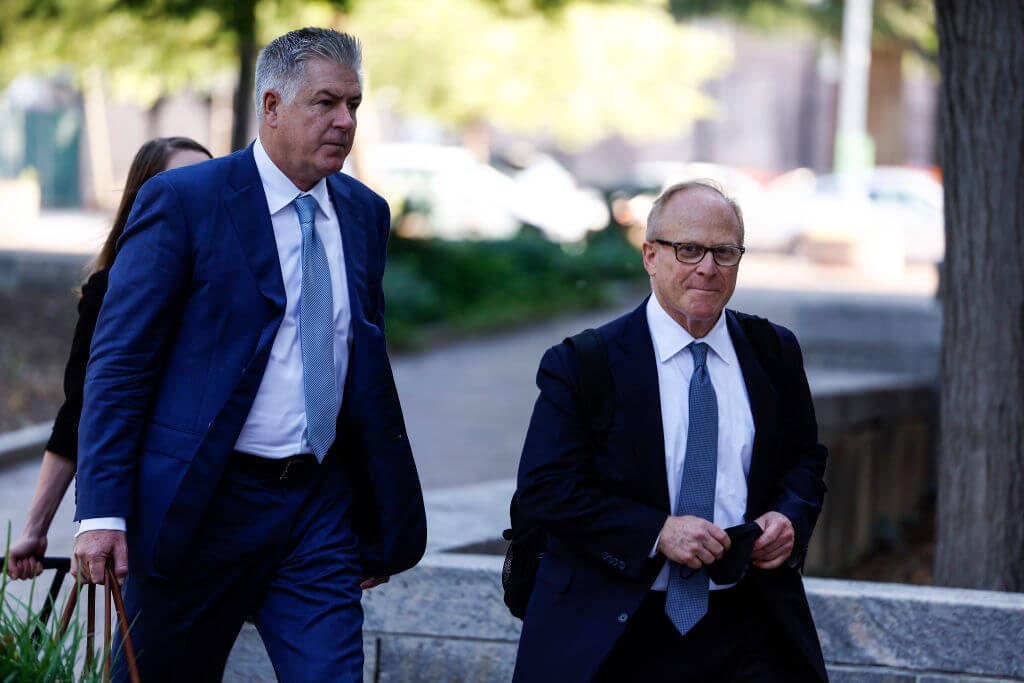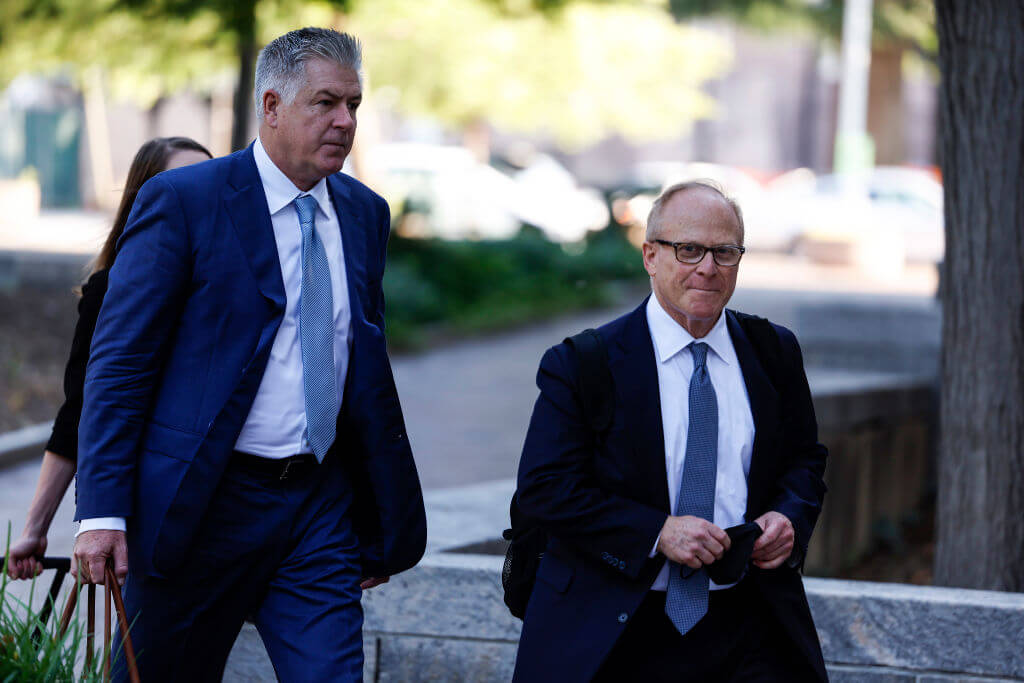Uncategorized
US soldiers stationed in Kiryat Gat turn sleepy Israeli city into an unexpected hotspot

(JTA) — At one of Kiryat Gat’s main shopping complexes, U.S. Army camouflage does everything but blend in.
American troops in fatigues move between shawarma stands and sports-shoe stores, a new presence in the southern industrial city, part of a multinational civil-military coordination center set up to monitor the Gaza ceasefire. The center, housed in a converted logistics building about 15 miles from the Gaza border, opened last week with roughly 200 American personnel as well as smaller contingents from at least eight other countries.
By the weekend, the sight of Americans in uniform had become routine. “Big guys, all in perfect formation,” one shopkeeper at the BIG mall told the Walla news site, “like they came out of a Hollywood movie.”
Cafes, restaurants, and food delivery services have been “working around the clock” to accommodate the city’s new foreign guests. On social media, commenters called the deployment “a new world order,” noting that Kiryat Gat was trending for the first time in years — and not because of pop star Ninet Tayeb, still the city’s most famous export.
City officials have leaned into the moment. Mayor Kfir Swisa publicly welcomed the deployment, telling residents the personnel were “received with open arms,” framing the center as both a security asset and an unexpected local boon. Senior U.S. officials have visited the site in quick succession, including Vice President JD Vance and Secretary of State Marco Rubio, who said U.S. ambassador to Yemen Steven Fagin would oversee the civilian side of operations, while U..S Central Command’s Adm. Brad Cooper would handle the military track, including Hamas’s disarmament.
During an interview on Channel 12’s current-affairs program, host Avri Gilad asked Swisa whether the arrival of the Americans had changed life in the city. Swisa replied that it “puts Kiryat Gat on the map,” adding that “now the Americans have also realized what many young Israelis already know” — that the city’s location near the cross-country Highway 6, its rail link, and its “rich cultural and sports scene” make it an appealing place to be.
Gilad cut in, “They didn’t come here for the sports life.” He went on to ask if there had been “any new love interests,” echoing online chatter about whether romances might bloom between U.S. soldiers and local women, before inquiring how many McDonald’s branches Kiryat Gat has.
“They haven’t asked for a hamburger yet,” Swisa said. “They’re enjoying the local Kiryat Gat food.”
The BIG shopping complex where the American soldiers have been spotted is in Carmei Gat, a neighborhood whose rapid growth prompted one mainstream Israeli newspaper to dub Kiryat Gat as the new capital of the Negev, overtaking Beersheba as the region’s commercial hub. A new housing agreement set to be signed later this week in the presence of Prime Minister Benjamin Netanyahu will add 21,000 apartments in Carmei Gat, doubling Kiryat Gat’s size and making it one of the 10 largest cities in Israel.
The neighborhood is also home to evacuees from Nir Oz, the Gaza envelope kibbutz that was relocated there after being attacked on Oct. 7. One convenience store owner, Shai Avisror, himself displaced from Kibbutz Zikim, said anyone arriving in uniform gets a free coffee or cold drink.
“Soldiers are the holy of holies,” he told one reporter, though it’s unclear if the same rule applies to the Americans.
Not everyone shared Swisa’s enthusiasm, with some residents warning that the American presence would endanger the city. “Until now it was relatively quiet here, and now we have become a strategic target,” one commenter wrote. Another wrote that the deployment would give “Hamas, Iran and the Houthis a reason to launch missiles” at the city, and advised homeowners to start selling apartments quickly because “Kiryat Gat is about to become Ofakim” — a reference to the Gaza envelope town that was attacked on Oct. 7. A third commented that while the city now boasted “a U.S. command center,” it still lacked “a cinema, a vehicle-testing station, a pub or even one good restaurant open on weekends.”
He added, “Thank God we are on Highway 6 and can get away fast.”
One commenter went further, alleging that the Americans were “FEMA soldiers” forming a multinational force that would eventually replace the IDF and police “in preparation for a single world government,” a conspiracy theory tied to claims about “Agenda 2030.”
Much of the commentary reflected a broader unease over who is now directing events in Gaza. One user warned that “the Americans are only the beginning,” predicting “an airlift of Turkish and Indonesian soldiers soon and God knows who else they’ve sold us to.” Referring to Netanyahu as “Trump’s prime minister,” one commenter tied the moment to the dispute over the haredi draft, writing that with ultra-Orthodox men refusing to enlist, “there’s no choice now but to bring in American reinforcements.”
Netanyahu has said he would not allow the deployment of Turkish troops in Gaza and insisted that Israel remains fully sovereign, telling his cabinet that it “does not seek anyone’s approval” for actions carried out there.
Critics say the Kiryat Gat command center reflects a mismatch between its stated purpose and Israel’s main security priorities, focusing on humanitarian coordination and ceasefire maintenance rather than disarmament and anti-smuggling operations. Meir Ben Shabbat, head of the Misgav Institute for National Security and Zionist Strategy and a former national security adviser, wrote in the Israel Hayom daily that Israel “must eliminate the vagueness concerning headquarters and mediation and coordination entities” and explain what the center will actually contribute toward achieving Israel’s objectives in Gaza.
But for now, the relationship between the U.S. soldiers and their newly adopted city is still in a honeymoon period. An AI-generated video circulating on social media and shared by the city showed an American soldier speaking fluent Hebrew and praising Kiryat Gat’s “falafel, with tahina and amba — just delicious.”
The post US soldiers stationed in Kiryat Gat turn sleepy Israeli city into an unexpected hotspot appeared first on The Forward.
Uncategorized
A border official mocked an attorney for observing Shabbat. Orthodox lawyers say the issue is not new.

Gregory Bovino, the Border Patrol official who led immigration raids in Minneapolis, reportedly mocked the Jewish faith of Minnesota’s U.S. attorney during a phone call with other prosecutors in mid-January. According to The New York Times, Bovino complained that Daniel Rosen, an Orthodox Jew, was hard to reach over the weekend because he observes Shabbat and sarcastically pointed out that Orthodox Jewish criminals don’t take the weekends off.
The call took place at a moment of extreme tension in Minneapolis, as federal agents under Bovino’s command carried out an aggressive immigration crackdown that had already turned deadly. It came between the fatal shootings of Renée Good and Alex Pretti, both killed during enforcement operations, and amid fierce backlash from local officials and residents.
Bovino made the remarks in a derisive, mocking tone, the Times reported, casting Shabbat observance as a point of ridicule. Bovino had already drawn national attention for frequently wearing an olive double-breasted greatcoat with World War II-era styling, leading some critics to call him “Gestapo Greg” and accusing him of “Nazi cosplay.” Bovino, who pushed back on those comparisons, has since been reassigned.
Rosen, a Trump nominee, was confirmed as Minnesota’s U.S. attorney in October 2025 after a career in private practice and Jewish communal leadership. He has said that rising antisemitism helped motivate his decision to take the job, and that prosecuting hate crimes would be a priority for his office.
For many Orthodox Jewish lawyers, Bovino’s alleged remarks were not surprising. They echoed a familiar challenge: explaining that Shabbat — a full day offline — is not a lack of commitment, but a religious boundary that cannot be bent without being broken.
In a profession that prizes constant availability, that boundary can carry consequences. Some lawyers say it shows up in subtle ways: raised eyebrows, jokes about being unreachable, skepticism when they ask for time off. Others say it has shaped much bigger decisions, including how visibly Jewish they allow themselves to be at work.

David Schoen, an Orthodox criminal defense attorney who served as lead counsel for President Donald Trump during his second impeachment trial, said he has long been mindful of how religious observance is perceived in the courtroom.
“I have made a conscious decision not to wear my yarmulke in front of a jury,” Schoen said, explaining that jurors often “draw stereotypes from what they see.”
Those concerns were reinforced by experience. Schoen said he has noticed a “definite difference in attitude” from some judges depending on whether he wore a yarmulke. In one case, he recalled, a Jewish judge pulled him aside during a jury trial and told him she thought he had made the right choice — a comment Schoen said he found disappointing.

For Sara Shulevitz, a criminal defense attorney and former prosecutor, the Bovino episode brought back memories from early in her career.
Orthodox and the daughter of a Hasidic rabbi — now married to one — Shulevitz said her unavailability on Jewish holidays was often treated as a professional flaw rather than a religious obligation. “It held me back from getting promotions,” she said.
In court, the scrutiny could be blunt. “I was mocked by a Jewish judge for celebrating ‘antiquated’ Jewish holidays,” she said, recalling requests for continuances for Shemini Atzeret and Simchat Torah. In another case, she said, a judge questioned her request for time off for Shavuot and suggested she had already “taken off for Passover.”
When another judge assumed Passover always began on the same day in April, “I had to explain the Jewish lunar calendar in the middle of court while everyone was laughing,” she said.
Not every encounter, Shulevitz added, was rooted in hostility. Sometimes judges simply didn’t understand Orthodox practice. When she explained she couldn’t appear on a Jewish holiday, judges would suggest she join the hearing by Zoom — forcing her to explain that Orthodox Jews don’t use electrical devices on Shabbat or festivals.
The misunderstanding often slid into a familiar assumption. “They think you’re lazy,” she said. “It’s not laziness. Any Jewish woman knows how much work goes into preparing for Passover.”
Rabbi Michael Broyde, a law professor at Emory University who studies religious accommodation, said that Bovino’s alleged “derogatory remarks” are “sad and reflects, I worry, the antisemitic times we seem to be living in.”
He added that the criticism of Rosen reflected a basic misunderstanding of how law offices operate, calling it “extremely rare” for a lawyer’s religious practices to interfere with their obligations, especially when senior attorneys delegate work and courts routinely grant continuances.
“No one works 24/7,” Broyde said.
The episode echoed a similar Shabbat-related incident during Trump’s first term. In his 2022 memoir, former Trump trade adviser Peter Navarro described how a group sought to undermine Trump son-in-law Jared Kushner’s role in the 2020 campaign by scheduling a key White House meeting with Trump on a Saturday, knowing Kushner — who is Shabbat observant — would not attend. Navarro titled the chapter recounting the episode, “Shabbat Shalom and Sayonara.”
The tension between Jewish observance and public life is not new. Senator Joe Lieberman, the first observant Jew to run on a major-party presidential ticket, famously walked to the Capitol for a Saturday vote and ate fish instead of meat at receptions. His longtime Senate colleague Chris Dodd joked that he became Lieberman’s “Shabbos goy.”
Still, Schoen said, visibility can cut both ways. During Trump’s impeachment trial, while speaking on the Senate floor, he reached for a bottle of water and instinctively paused. With one hand holding the bottle, he used the other to cover his head — a makeshift yarmulke — before drinking.
The moment was brief, but it did not go unnoticed. In the days that followed, Schoen said he heard from young Jewish men and businesspeople who told him that seeing the gesture made them feel more comfortable wearing their own yarmulkes at work.
The attention, he said, was unexpected. But for some in the Orthodox community, it became a source of pride.
“I felt honored,” Schoen said.
My guess in all seriousness is that he normally wears a yarmulke and this was reflex. Schoen is modern Orthodox so that would make sense. But I defer to @jacobkornbluh https://t.co/MkKx6W03v2
— Jake Tapper 🦅 (@jaketapper) February 9, 2021
Jacob Kornbluh contributed additional reporting.
The post A border official mocked an attorney for observing Shabbat. Orthodox lawyers say the issue is not new. appeared first on The Forward.
Uncategorized
Deni Avdija becomes first Israeli to be selected as an NBA All-Star
(JTA) — Portland Trail Blazers star Deni Avdija’s meteoric rise has officially reached a new stratosphere, as the 25-year-old forward has become the NBA’s first-ever Israeli All-Star.
Avdija was named an All-Star reserve for the Western Conference on Sunday, an expected but deserved nod after the northern Israel native finished seventh in All-Star voting with over 2.2 million votes, ahead of NBA legends LeBron James and Kevin Durant. Avdija’s breakout performance this season has earned him repeated praise from James and others across the league.
Avdija’s star turn began last year in his first season with Portland, when he further captured the adoration of Jewish fans across Israel and the U.S. But he took another step forward this season, averaging 25.8 points, 6.8 assists and 7.2 rebounds per game. His points and assists clips are by far the best of his career, and rank 13th and 12th in the NBA, respectively. He’s considered a front-runner for the league’s Most Improved Player award.
For close observers of Israeli basketball, Avdija’s All-Star selection is the culmination of a promising career that began as a teenage star with Maccabi Tel Aviv and made him the first Israeli chosen in the top 10 in an NBA draft.
“Deni Avdija being named an NBA All-Star reserve is an unbelievable achievement in the mind of every Israeli basketball fan,” Moshe Halickman, who covers basketball for the popular Sports Rabbi website, wrote in an essay for the Jewish Telegraphic Agency. “This is a dream come true for many — a dream that became realistic and even a must-happen during his breakout season — but something that in his first five seasons in the NBA never came across as something that was going to be real.”
Halickman, who has covered Avdija in Washington, D.C., and in Israel, wrote that Avdija is not only considered the greatest Israeli hooper of all time, but perhaps the best athlete to come out of Israel, period.
Oded Shalom, who coached Avdija on Maccabi Tel Aviv’s Under-15 and Under-16 teams, echoed that sentiment in a recent profile of Avdija in The Athletic.
“Even though he is only 25, I think he is Israel’s most successful athlete in history,’’ Shalom said. “We’ve had some great gymnasts — and I hope everyone forgives me for saying it, because we’ve had some great athletes — but I think Deni has become the greatest.”
Avdija’s ascension has also come against the backdrop of the Gaza war and a reported global rise in antisemitism, which he has said affects him personally.
“I’m an athlete. I don’t really get into politics, because it’s not my job,” Avdija told The Athletic. “I obviously stand for my country, because that’s where I’m from. It’s frustrating to see all the hate. Like, I have a good game or get All-Star votes, and all the comments are people connecting me to politics. Like, why can’t I just be a good basketball player? Why does it matter if I’m from Israel, or wherever in the world, or what my race is? Just respect me as a basketball player.”
Now, Avdija’s talents will be on display at the NBA All-Star Game, on Sunday, Feb. 15, in Los Angeles.
The post Deni Avdija becomes first Israeli to be selected as an NBA All-Star appeared first on The Forward.
Uncategorized
Democratic leader says GOP-led Congress boosted ICE funding while Jewish security is underfunded

House Democratic Leader Hakeem Jeffries used a Jewish gathering in New York on Sunday to spotlight what he described as an imbalance in federal priorities, building on outrage over the Trump administration’s violent crackdown in Minneapolis that resulted in two fatal shootings.
Jeffries criticized the Republican-controlled Congress for boosting immigration enforcement funding by billions while, he said, security funding for Jewish institutions continues to lag amid rising antisemitic threats. He said that in the One Big Beautiful Bill Act, which passed last July and included cuts to Medicaid, the Department of Homeland Security received an additional $191 billion, including $75 billion for ICE.
“If that can happen, then the least that we can do is ensure that this vital security grant program is funded by hundreds of millions of dollars more to keep the Jewish community and every other community safe,” Jeffries said.
The Nonprofit Security Grant Program, established by Congress in 2005 and administered by FEMA under the Department of Homeland Security, provides funding to nonprofits, including houses of worship, to strengthen security against potential attacks. Congress began significantly increasing funding in 2018 after a wave of synagogue attacks nationwide, bringing the program to $270 million today.
Major Jewish organizations are pushing to raise funding to $500 million amid rising antisemitic threats. Last year, the Trump administration briefly froze the program as part of broader agency cuts, and some groups have been reluctant to apply because applicants must affirm cooperation with federal immigration enforcement.
Jeffries said House Democrats strongly support an increase to $500 million annually to meet escalating security needs. “It’s got to be an American issue, because that is what combating antisemitism should be all about,” he said.
The breakfast, previously held at the offices of the UJA-Federation of New York, was held this year for the first time in the events hall at Park East Synagogue, which was the site of a pro-Palestinian protest last year that featured antisemitic slogans and posters.
Sunday’s program also included remarks from Senate Minority Leader Chuck Schumer, who told the audience that his support for Jewish security funding will only continue growing under his leadership, calling it his “baby.”
“As long as I’m in the Senate, this program will continue to grow from strength to strength, and we won’t let anyone attack it or undo it,” Schumer said.
Rep. Jerry Nadler, the co-chair of the Congressional Jewish Caucus who is retiring at the end of the year after 36 years in the House, also spoke at the event. Nadler, like several other Democrats in recent months, compared the actions of ICE agents to the Gestapo, Nazi Germany’s secret police. The comparison has drawn sharp criticism from Democrats, Republicans and Jewish leaders.
Support for Israel aid

Both Schumer and Jeffries vowed in their remarks to continue supporting U.S. military assistance to Israel, amid increasing calls within the party for sharper opposition to Israel. Polls show that Democratic voters are increasingly sympathetic to Palestinians. In July, a record 27 Senate Democrats, a majority of the caucus, supported a pair of resolutions calling for the blocking of weapons transfers to Israel.
“I think it’s the humane thing to do to ensure that Israel has a right to exist as a Jewish and democratic state and eternal homeland for the Jewish people,” Jeffries said. The House Minority Leader, who has cultivated close ties with Jewish leaders since his election in 2012, noted that he has visited Israel nine times. He recalled that on his recent trip, Israel’s ambassador to the U.S., Yechiel Leiter, joked that it might be time for Democrats to buy property in Jerusalem.
Schumer, the nation’s highest-ranking Jewish elected official, has seen his popularity decline and has faced calls to step down from his role as leader. On Sunday, he pledged that he “will always fight to give Israel what it needs to protect itself from the many who want to wipe Israel off the face of the map.”
The post Democratic leader says GOP-led Congress boosted ICE funding while Jewish security is underfunded appeared first on The Forward.


